
As you can see, I have been working very hard at the Olympic challenge since we went swimming four weeks ago…
Unfortunately, the “working very hard” bit is true, but sadly I’ve not been working on anything as interesting or fun as all of this. I was also away for a few days playing golf in Holland. Two things of Olympic note occurred while I was there.
The first I’m hoping might not be as much of a problem as it felt like at the time. As I walked onto a tee box, my left knee (the “good” one) made a popping sound and suddenly I couldn’t straighten it (stop me if this is starting to sound familiar). I wiggled it about a bit, there was another pop and everything seemed back to normal. I strapped it up for the rest of the trip and favoured the other leg (”There's a lot of it about, probably a virus, keep warm, plenty of rest, and if you're playing football or anything try and favour the other leg.”).
Then, the morning after I got home, I climbed out of bed only to have it pop out of place again (the knee, not the bed). This time it took me half an hour (and rather more wiggling than I really like to start the day with) to get it back into place; by the time I did, the joint had filled with fluid and it hurt like hell.
Three days working from the sofa with my leg elevated, covered in ice and an assortment of frozen vegetables, seemed to do the trick. The swelling went down, the pain it was causing subsided, and the limp became less Douglas Badder and more Huggy Bear. Now, the limp is gone, the knee feels fine, and last night I even ran about 50 yards at a fair lick to catch a bus.
All of which sounds great, but I’m still feeling a bit like I'm walking around on a time bomb that could have me back in the hospital again at any minute. At least I’d know the drill I suppose.
The other thing of note that occurred in Holland was more of a realisation than an injury (for a change). As I mentioned, I was playing golf, a game I’ve played since I was old enough to draw breath. At one stage in my life I even got reasonably good at it.
These days I’m diabolically bad. There is the occasional flash of something encouraging, but really, when you’re stumbling about in the dark, an occasional flash tends to be more disorientating than helpful.
The thing is, I used to care. I used to get really quite upset on the golf course about how bad I had become. I would break clubs and unleash vitriolic streams of very unsavoury language in the aftermath of a really bad shot (of which there were many). I made a decision a couple of years ago after a particularly embarrassing outburst that I was not only ruining the game for myself, but also making the people I was playing with rather uncomfortable. It had to stop.
I’m delighted to say that it has stopped, and while I was away in Holland my golf was so bad (and I was so far out of contention) that I had plenty of time to think about why it has stopped, and why I’m now wandering about the course like the Dalai Lama ("Big hitter, the Lama") instead of Happy Gilmore.
In the space of a month I had played incredibly badly (even for me) in a tournament in Northern Ireland in front of a bunch of people I used to consider my peers, and then there I was walking around a course in Holland with half my old university team, all of whom had left me for dead by the end of the first nine on the first day. I should have been spitting with rage.
Finally I realised what has made the difference, what has stopped me getting cross, and consequently let me enjoy playing again (or at least enjoy it more than I have done for a while). It’s failure. It’s being rubbish at things. Perhaps most importantly, it’s failing and being rubbish on a regular basis. In short, it’s this challenge.
By forcing myself to try things that I think I can’t do (but sometimes surprise myself with – the BBC’s coverage of this year’s London Triathlon was on TV last week and I watched it with a renewed sense of disbelief that I made it round last year), by constantly putting myself out of my comfort zone, and by having to rely on a lot of help from a lot of people, I’ve come to enjoy trying things, even if I don’t succeed.
As I’ve mentioned previously, that’s what the Olympics are supposed to be all about – trying your best (no matter what Sean Connery had to say in The Rock about "losers" who say that) and not worrying too much about the outcome.
It would seem that the deep end is my new comfort zone, which should make this little lot a piece of cake, right, Ben?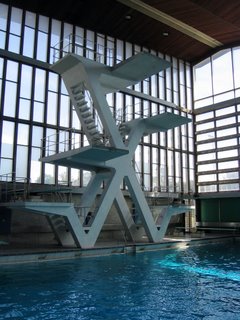
(with belated thanks to my synchronised diving partner for the photos)
P.S. Also thanks to Ben, here's some video footage. Ben, you're either a bad typist or a comic genius - "Ultimate Olumpian"? I might run with that from now on.
The Deep End
Posted by John McClure at 1:03 pm 2 comments
Swimming Pictures
Rather than weave these into the previous post, I thought I'd save you all the trouble of going looking for the shots of me and the boys in our swimming trunks. Brace yourselves.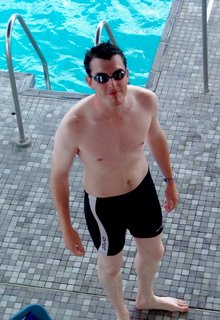
Fighting fit and ready to go - three days later and the only bit of me that's still sore is the bridge of my nose - note to self: don't buy new goggles the day before you go for a 3 hour swim session. With feet that big, I should have been quicker. Still, nice tan, eh?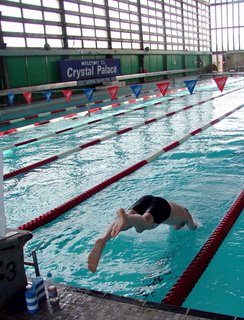
Not unlike Eric Moussambani, my diving wasn't ideal. I think I spent the first twenty metres after this one trying to work out if I was in too much pain to continue with the race. I braved it out in the end. I know they're closer to the camera than the rest of me, but I've never noticed just how ridiculously big my feet are. Sideshow Bob-tastic!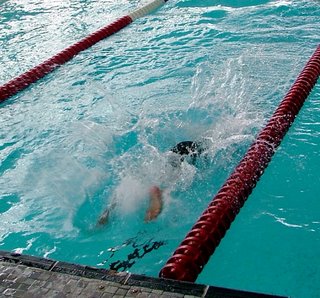
Introducing Mr David Hockney on Fuji Finepix... nice work, Mr H.
They say the camera never lies, but I assure you I was trying a lot harder than this photo makes it look like I am. The vent on the right of shot is where they let the sharks out when you're not looking.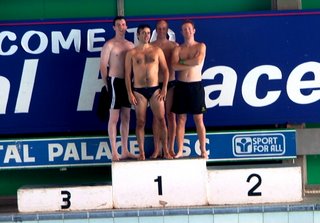
The relay team of the gods - from left to right: Mildly Embarrassing McClure, Doggy Paddle Diogo, Iron Mike Butterfly & Blistering Backstroke Ben. I can assure you that the pool at Crystal Palace is not on a slope - the only man we could find to take our picture had a worn down wooden leg.
There is some video to come, but I'm still working on the technical glitches.
Posted by John McClure at 10:39 pm 2 comments
Eight Events in One Day
 Thorpedo in the Water!
Thorpedo in the Water!
Usually, before I do an event, I write a preview. On this occasion, I was pushed for time; but I was also planning to attempt eight (swimming) events in one day, so thought eight previews might be a little much. I know, however, that a certain other John likes a good preview, and it was his birthday last week, so rather than disappoint him altogether, I thought I’d mash the previews through the review and see how that comes out. Probably as the longest blog entry in history – brace yourselves.
Swimming is one of the Olympic sports in which I have a hero. For my money swimmers don’t get anything like as much recognition as they should – I suppose they’re too anonymous when they’re in the water, or maybe people just don’t understand how incredibly fit and dedicated the best ones are.
My swimming hero hasn’t been my swimming hero for very long, but I can’t conceive of anyone ever being able to replace him at the top of the list (which roughly, from second place, pans out: Thorpe, Moorhouse, Phelps, Goodhew, Eric “The Eel” Moussambani).
He has won eight Olympic medals (4 gold, 2 silver, and 2 bronze), nine World Championship medals (3 of each), and sixteen European Championship medals (8 gold, 3 silver, and 5 bronze); and yet, the chances are, you’ve never heard of him. He holds 14 British records, 8 European records, and 7 world records. He is Sascha Kindred.
His twin brother, Timo, did the triathlon with me last year. Like Timo, Sascha’s an impossibly nice man. Unlike Timo, Sascha has cerebral palsy. They’d both kick your ass in the pool – on Saturday, I went to Crystal Palace to have a go in a 50-metre pool, clock my times, and find out by how much.
My day began at 06:30 – usually, if I see this time of the day, it means I’ve had a great night out and it’s time to get some rest, but today it heralded something that I believe is referred to as ‘Saturday morning’. It was a shock to discover that the world not only exists, but also manages perfectly well without me before lunchtime at the weekends. I gathered my thoughts, and my high-energy foodstuffs, and headed to London on the bus with Michael and Diogo.
We arrived at the Crystal Palace National Sports Centre (which, for all the signposts it doesn’t boast, ought to be renamed the Crystal Maze National Sports Centre) by about 10:30, in time to meet Ben, the fourth member of what would prove to be a remarkable relay squad.
We paid our money and made our way into the depths of the swimming pool complex. The whole place is like a man who has been living alone for too long – it’s a bit frayed at the edges, nothing is quite as clean as it ought to be, and there’s a funny smell that you don’t really want to inhale for long enough to be able to describe.
Despite all that, the sheer scale of a 50-metre swimming pool is impressive when you are used to training – all right, when you occasionally swim – in a 25-metre one. It looks big, but somehow, it also looks manageable (appearances, it later turned out, can be deceptive). Perhaps what made it seem manageable was the constant spectre of the 10 metre diving platform, which seemed anything but manageable, lingering behind us throughout.
We weren’t there to dive though – we’d been told we couldn’t without being part of a club or receiving instruction (which costs an arm and a leg; ironic, given that these are exactly what you might lose if you tried it without help) – but both Ben, who has agreed to be the other half of the synchronised dives, and I could hardly look away from the diving pool throughout the 3 hour swim session.
By the end, I think we had convinced ourselves that the 3 metre springboards present no real problem, but that even the steps up to the 10-metre board look frightening, especially when you consider how tricky they might be to negotiate backwards with your tail firmly planted between your legs – never mind trying to do all that in time with your partner.
But I digress – the mission on Saturday was in the other pool – eight events in one three-hour session.
Event 1 - 200m Freestyle
Ian Thorpe’s World record – 1 minute 44 seconds
My time – 4 minutes 24 seconds
% Olympian – 40%
The first thing to note about freestyle is that, as the name implies, the swimmer can use any style he or she likes, and touch the wall with any part of the body at the turns and the finish. This was one of many useful little titbits I picked up from Dave Wallechinsky’s excellent book last night, and would come in very handy during this first event.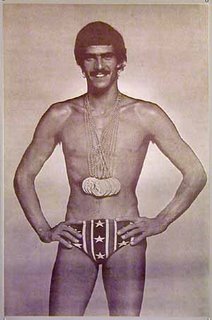 Mark Spitz - how much faster might he have been without the 'tache?
Mark Spitz - how much faster might he have been without the 'tache?
This event was Mark Spitz’s third of seven gold medals at the 1972 Munich Olympics. The winner in the 1988 games was the largely unfancied Duncan Armstrong of Australia. He beat the mighty Matt Biondi into third place, breaking the world record in the process, by using a rather ingenious tactic. He was assigned lane 6, with Biondi inside him in lane 5. At his coach’s suggestion, Armstrong swam as close to Biondi’s lane as he could for the first 150 metres - “I just sucked into his trough and bodysurfed the first 100 metres” – before slingshotting his way to the front with 20 metres to go.
My race plan was slightly different, and based rather more loosely around the notion of not drowning. I dived in and felt very good for 20 metres, despite the absence of Matt Biondi in the next lane. I was breathing every two strokes and felt comfortable. Then I felt a little short of breath, so I switched to breathing with every stroke. Then I realised I wasn’t even going to make it to the end of the pool if I didn’t switch to breaststroke. Which was quite embarrassing. In the end, I touched home in a time of 4 minutes 24 seconds. Which was also quite embarrassing. Thorpe could have swum twice as far in the same time, and still have had time to get out and throw a couple of shrimps on a barbie in the time it took me.
Event 2 - 4 x 100m Freestyle
South African World record – 3 minutes 13 seconds
Our time – 6 minutes 51 seconds
% Olympian – 47%
Coming into the 2000 Olympic final, the USA had won this event every time it had been held. Despite being 6 tenths of a second down with 50 metres to go, and having won the 400m individual freestyle less than an hour earlier, a 17 year-old Ian Thorpe swimming the anchor leg for Australia somehow managed to overtake Gary Hall of the US to claim the first ever non-US victory for Australia… in Australia. There’s a rumour a few beers were drunk that night, but I’m not sure I believe it.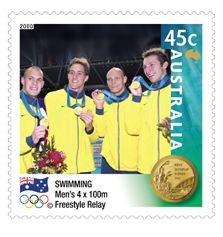 So good they made it into a stamp.
So good they made it into a stamp.
This event afforded me some help, in the shape of three other swimmers. Despite Michael’s best (and very impressive) efforts, we still didn’t manage to sneak inside the double-the-world-record pace we had tentatively set as a target in each event. It probably didn’t help that I was still doing breaststroke.
Event 3 – 100m Breaststroke
Brendan Hansen’s World record – 00:59.30
Sascha Kindred’s World record – 01:22.98
My time – 1 minute 58 seconds
% Olympian – 50% He never wanted to be a swimmer for a living; he wanted to be... a LUMBERJACK!
He never wanted to be a swimmer for a living; he wanted to be... a LUMBERJACK!
Duncan Goodhew fell out of a tree when he was 10 years old, an accident that caused him to lose all his hair, which never grew back. Bullied at school for being bald and dyslexic, Goodhew went to Moscow in 1980 determined to raise two fingers to his juvenile detractors by winning a gold medal as shiny as his head. He won the final by four tenths of a second.
As a twelve year-old, Adrian Moorhouse watched David Wilkie win a gold medal in the 200m breaststroke and was inspired to start training in earnest. In 1984, he swam a disappointing final and finished fourth. While he was still in Los Angeles, he got a telegram from his old Sunday school teacher – “Very bad luck, all proud of you. There will be a next time.” – which he kept and later tucked into the box that contained his gold medal from the 1988 games.
This event is one I finally felt reasonably comfortable with throughout. I saved a bit for the finish and just about managed to scrape inside the target time. I was growing increasingly tired by this point however. It’s all very well not eating before you swim, but it doesn’t do much for the energy levels.
Event 4 – 4 x 100m Medley
US World record – 3 minutes 30 seconds
Our time – 8 minutes14 seconds
% Olympian – 43%
This event wasn’t on the list for this trip, but Michael took me aside and uttered in a hushed and confidential tone that he might be able to do 100 metres of butterfly if I wanted to try for the medley relay. With Ben having shown himself to be an expert backstroker, and Diogo kind enough to let me do the breaststroke leg (is it just me, or is this sport riddled with innuendo?), in true Ultimate Olympian style, we jumped at the chance to have a go at something unplanned.
Ben led off with an expertly executed backstroke leg. I followed up with an average breaststroke leg, but all was really just preamble to Mighty Michael (as he shall henceforth be known) and his butterfly leg. He swept away from the start like some over-excited (and possibly slightly epileptic) dolphin – which sounds bad, but actually that’s just what perfectly executed butterfly looks like. The three of us watched in awe as he turned and just kept on coming. He was tired when he finished, but it was, all sarcasm aside for once, one of the most impressive sporting things I’ve ever seen.
Diogo brought us home with some mighty fine freestyling, someone noted down the time, but I don’t think any of us cared – we’d witnessed something a bit special, no matter how long it took.
Event 5 – 200m Breaststroke
Brendan Hansen’s World record – 2 minutes 9 seconds
Sascha Kindred’s World record – 2 minutes 56 seconds
My time – 4 minutes 29 seconds
% Olympian – 48%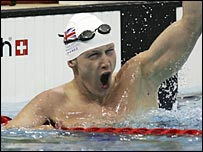 Sascha Kindred - collector of world records.
Sascha Kindred - collector of world records.
In 1976, 12 of the 13 men’s swimming events were won by the USA. The only one that wasn’t was won by Scotland’s David Wilkie who set a new world record and became the first British swimmer for 68 years to win an Olympic title (and, in so doing, inspired a young Adrian Moorhouse).
My ambitions were slightly lower. Despite the encouragement of Ben, Diogo and Michael as I came to the finish, I didn’t quite manage to be half an Olympian. There’s video of this one, but you’ll have to wait a day or two while we work out how to rotate it through 90 degrees so you can see it!
Event 6 – 4 x 200m Freestyle
Australia’s world record – 7 minutes 4 seconds
Our time – 16 minutes 55 seconds
% Olympian – 42%
We revised our target for this one to 17 minutes. I think we all thought we were very unlikely to beat that mark when we started, and with the best will in the world, Diogo, Ben and I were a little glum as Michael set off for the final leg with 14 minutes already elapsed. Halfway through his final length, I started getting excited. If he didn’t tie up in the final 25, there was a chance we might do it… all right, there was a chance Mike might do it for us. In the end, he didn’t even make it tense, swimming a final leg of 2 minutes 55 seconds to see us smash the mythical 17-minute mark. The man’s a machine.
Event 7 – 50m Freestyle
Alexander Popov’s world record – 21.64 seconds
Sascha Kindred’s British record – 33.06 seconds
My time – 61 seconds
% Olympian – 35%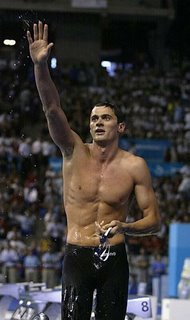 Excuse me, Mr Popov - how many Olympic medals did you win?
Excuse me, Mr Popov - how many Olympic medals did you win?
Re-introduced in 1988, the 50m freestyle inspired one of Olympic swimming’s great rivalries. For the best part of 15 years, Matt Biondi and Alexander Popov traded titles and world records like men possessed. Very exciting it was too, but my favourite 50m freestyler is Samson Ndayishimiye of Rwanda who, in the games of 2000, was the slowest competitor (recording a time of 38.76 seconds). The highlight of the games for him was swimming in a clean pool that was two and a half times longer than the dirty hotel pool he had trained in.
Having recorded a 57 second split in the first half of my 100m breaststroke, I was confident I could beat the minute mark in this one. If I’d done breaststroke, perhaps I would have done, but for some reason I stuck to crawl, despite tying up like Houdini in the final 10 metres and missed the minute mark by the narrowest of margins. I’d stopped being embarrassed by that stage. I was just tired.
Event 8 – 100m Freestyle
Pieter van den Hoogenband’s world record – 47.8 seconds
Sascha Kindred’s PB – 1 minute 13 seconds
Eric “The Eel” Moussambani’s time in Sydney 2000 – 1 minute 52 seconds
My time – 2 minutes dead (which is what I nearly was by the end)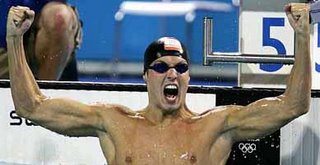 Pieter van den Hoogenband - Holland's aqua-weightlifting sensation.
Pieter van den Hoogenband - Holland's aqua-weightlifting sensation.
There was much mocking of Eric the Eel at the start of the session. How we laughed at his unfortunate attempt to qualify for the latter stages of the 2000 games! How we slowly stopped laughing so much as we realised I hadn’t a snowflake’s chance of beating his time.
Eric arrived in Sydney expecting to swim in the 50m event, but his coach decided at the last minute that he should do the 100m instead. Good in theory, but the fact that Eric had never swum that far in one go before in his life might have given him pause. Eric’s heat contained just three swimmers, but when the other two both produced a false start and were disqualified, Eric was left to swim the heat alone against the clock.
Despite a slightly bellyflopped dive into the pool and swimming with his head above the water, he somehow nailed the first 50 metres in under 41 seconds, but he’d used up just about all his energy and the second lap became the stuff of legend. 5 metres from the finish, despite his continued thrashing, Eric stopped moving forward. Exhausted, disorientated, and probably mildly embarrassed, he was essentially treading water. The officials thought about stepping in.
Then the Sydney crowd came to life and adopted themselves a new hero. Their bellowing and encouragement somehow carried him to the finish. His time was more than 40 seconds slower than the next slowest participant’s, and seven seconds slower than Pieter van den Hoogenband’s winning time in the 200m event.
It was funny to watch, and you loved him for it. You loved him even more when you later read that having waved shyly to thank the crowd, Eric went back to the changing rooms and cried.
To his credit, inspired by the subsequent kindness shown to him by the public and many of the elite swimmers, Eric stuck at it and, in the 2001 World Championships, recorded a time in the 50m freestyle of 31.88 seconds.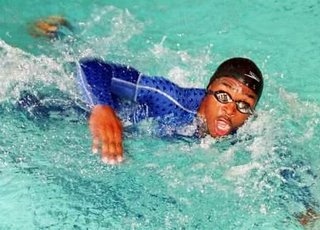 Eric Mousammbani - not the fastest, but comfortably quicker than me.
Eric Mousammbani - not the fastest, but comfortably quicker than me.
There’s some video here – with commentary in French especially for the Dubrannas.
Alexander Popov was somewhat better than Eric. After Popov won the 1996 100m freestyle (his second successive gold in that event) an American reporter asked him to name his favourite actor or actress. “This is an American question,” snapped Popov. “I don’t dream about actors and actresses. They should dream about me. I am reality, they are not.” Ironically, he had just become the first repeat winner of the 100m freestyle since Johnny Weissmuller, who you probably know better as the actor who played Tarzan.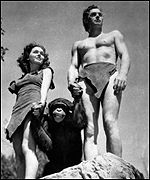 Johnny Weissmuller (with his wife and his coach).
Johnny Weissmuller (with his wife and his coach).
And so we reach the end of this titanic blog entry. Its length is related to its subject, and I’m hoping that by the time you get to this point (if you do) that you’re as tired as I was when I finished those eight events.
Now, if I can just knock off another 5 events quickly, there will be less than a hundred left to complete!
Posted by John McClure at 1:09 am 11 comments